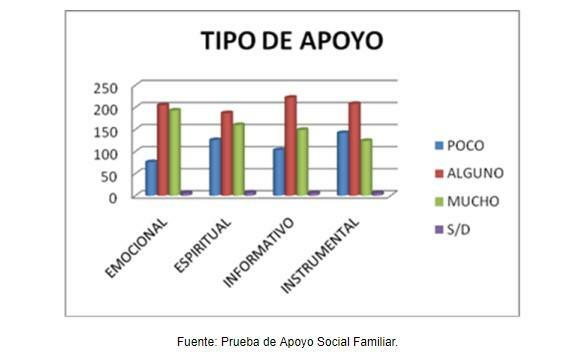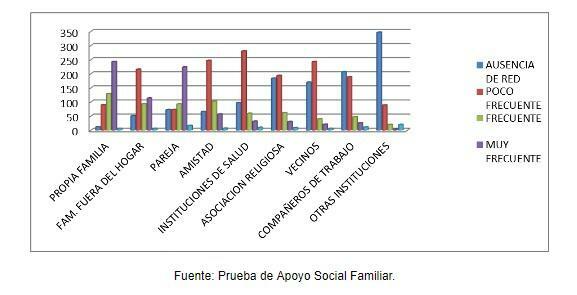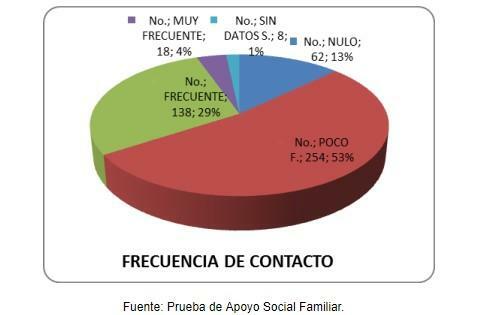
The important role played by the social support in the health-disease process, both in health promotion, disease prevention, and recovery. Social support constitutes the set of resources of diverse nature that families can count on in daily life and especially in certain situations. A distinction is made between the type of instrumental, material or tangible, informative and spiritual emotional support that is very necessary to face the demands of life. In this study of Online Psychology we are going to discover the family support in the most significant events of family life.
Index
- Social and family support: definition
- Method that was carried out in the study of family support
- Results: type of social support
- Social support networks used by families
- Frequency of contact with social networks
- Discussion
- Conclusions
- recommendations
Social and family support: definition.
On social support there are a large number of concepts that from the methodological point of view makes research difficult, since the form of measure it varies according to the theoretical conceptions of the author, so there is no uniformity in the elements evaluated by the scholars of the theme.
Miguel Roca, Cuban psychologist, student of the subject, in his book, "Social Support: Its significance for human health", defines social support, as existing social resources, of different natures that an individual receives in a given situation, in its bond with the environment through interpersonal relationships and that They can be perceived in a positive or negative way, influencing their well-being and ability to function in the face of illness in a dynamic way.1
Social media has proven to be very effective for the family, optimizing your health and restoring it when it is compromised. The family requires supportive social networks, which can provide affection, material, spiritual and informational help.
Social support reduces the negative effects of events, Lack of support causes negative consequences for the family, while good social support, both at the internally (the family itself), as well as externally (support networks), functions as a health protection factor family.

Method that was carried out in the study of family support.
A descriptive, cross-sectional study was carried out with a stratified sampling The studied population was 480 families, which would be distributed in the 25 colonies of the Ocotlán Municipality. The instruments were applied in the second week of June 2009.
- Normative events studied were: marriage, pregnancy, the birth of a child, the entry of a child into school, child adolescent, adult child who left home, retirement, expected death of the spouse in the dissolution stage of the family.
- The paranormatives: due to dismemberment, which is when a temporary or permanent separation of a family member occurs, an increase due to the incorporation of one or more family members, demoralization when the values and ethical-moral principles of the family are affected, important economic change and health problems, when the health of at least one member is affected of the family.
It was used The Family Social Support Test, This instrument makes it possible to identify the types of support received, the social networks most used by the family, the frequency of contacts with networks, satisfaction with the support received and the perception that the family has about the availability of support for. The instrument used is contained in a Family Assessment Methodology, validated in Cuban families. 2
The application was made in a way directed to the head of the family nucleus, by students of the Psychology career of the University of Guadalajara, Centro University of la Ciénaga in a home visit, where the objectives of the research were explained and the informed consent of the family.
Descriptive statistics methods were used for the analysis of the data, they were organized, classified and analyzed, using absolute frequencies and percentage analysis, were presented in tables and graphics.
Results: type of social support.
In the families studied, we found that they receive some type of support, informative (46%), emotional (43%), instrumental (43%) and spiritual (39%), received a lot of emotional (40%), spiritual (33%), informative (31%), and instrumental (26%) support. See graph 1: Type of support Social)
The families studied received very frequent the support of one's own family living in the home (51%) and from the partner (43%), rare, from health institutions (59%), neighbors (51%), friends (51%), extended family or living outside the home (45%), religious associations (40%) and absence of social support networks from other social and public institutions (72%) and coworkers (43%), (See graph 2: Social support networks used by families).

Social support networks used by families.
The frequency with which families established contact with social support networks, we found that contacts between families and networks were infrequent (53%), frequent 29%, having as relevant data that in some families contact with the network was never established in (13%) and very frequent only in (4%), (See graph 3: Frequency of contact with the networks social).

Frequency of contact with social networks.
In this case, satisfaction with the support received was high (51%). Families perceive support as received, answering in the category of a lot (45%), (See graph 4: Satisfaction and perception with the support received).

Discussion.
The families received the four types of support studied, firstly emotional, followed by spiritual and to a lesser extent informative and instrumental. Emotional support is related to affection that is given to the family, that makes it feel loved, loved, esteemed by others. The spiritual support that corresponds to the family receives to promote spiritual well-being of the members, this corresponds to the high index of religiosity in the municipality. The families studied have had a lack of informational support, they have lacked information and guidance. The greatest insufficiency has been in the instrumental support, which paradoxically is the one most needed by the family in daily life and it refers to financial aid, aid in services at home, with the care of children, the sick and the elderly.
Cardoso M. J. et al, indicates that having social support positively influences health. Considers that knowing in depth the mechanisms that interact during stressful situations provides effective therapeutic options to minimize the negative impact that moments of uncertainty have on health.
Support networks
The support networks are the systems of people and institutions that provide help to the family. They are conceived as social support networks, the social and health institutions that support the family, the institutions that provide public services, the social care, community, political, religious organizations, self-help groups, extended family, co-workers, friends, and even one's own family.
The most used social support networks were, the cohabiting family, the couple, to a lesser extent, health institutions, neighbors, friends, family of origin, religious associations and did not receive help from social and public institutions and fellow job. Family support continues to be the form most used by most families, both in the family context and by the spouse or partner. The family is considered as the main social support network that the individual has and therefore, it is recognized that it exerts a cushioning function against the stresses generated by life everyday. Little support was found from networks such as neighbors, in the same community, friends and co-workers.
The benefits of social support
The psychologist Ángel García de La Palmas, raises the beneficial health effects of social support, they are presented in two directions. Support as "main effect" occurs when social networks provide positive experiences on a regular basis, adequate information, which provides a positive, stabilizing effect. The other direction is the “stress moderator” support, in this case it plays a role in two different moments, it can intervene in the assessment of the event, attenuating its stressful effect and between the experience of stress and the beginning of the reaction, reducing the importance of the event, reassuring in such a way that the reaction is minor.4
The low presence of institutions health, religious and other public institutions such as social networks. It is shown that public, social and health institutions must do more present help to families, having programs or activities that are oriented to the families It should be noted that there were few family contacts with the networks.
Perceptions of the family
Satisfaction with the support received was acceptable, although it is observed that almost half of the families are not totally satisfied with the support received, so it cannot be said that families experienced total well-being in relation to aid received.
More than half of the families perceive the support received as insufficient, as they do not receive the support they needed. González N, considers the existing real support as important as the one that the subject perceives as potentially available.5
If we assume that social support networks are decisive for the family to successfully cope with the demands of their daily life, especially when they are "in trouble" and it is also recognized as a protective resource for health family. Public institutions have to achieve their social role, gaining the trust of the population to maintain and coordinate actions aimed at achieving a state of social welfare more high.
Conclusions.
- The study recognizes the importance of social support, constituting social networks a platform to cushion the effects of events on family life.
- The support that is most received is emotional and from family networks. Recognizing the family as an important agent of social support
- The families studied require more support, instruments, which refers to financial aid, aid in services at home, with the care of children, the sick and the elderly. These lack of support suffered by families increase their vulnerability.
- The most used social support network was the family; the rest of the networks have not fully fulfilled their functions.
- The support provided to the families did not meet all their needs, perceiving it as insufficient.
Recommendations.
- It is necessary to analyze existing policies to guarantee social support networks by doing more effective ones that exist and developing new networks that protect the most vulnerable families from society.
- The municipality must draw up new policies aimed at fostering social support networks for citizens and ensuring that they meet the needs of families.
- Community institutions should provide greater support to economically disadvantaged families in order to provide greater protection.
This article is merely informative, in Psychology-Online we do not have the power to make a diagnosis or recommend a treatment. We invite you to go to a psychologist to treat your particular case.
If you want to read more articles similar to Family support: significant events in family life, we recommend that you enter our category of Social psychology.
Bibliography
- Roca M. Social Support: Its significance for Human health. Havana: Editorial Félix Varela; 2000.
- Herrera P, González I. Methodology for evaluating the impact of family life events on family health. Cuban Magazine Medina General Integral. 2002; 18(2):169-72.
- Cardoso JM, et al. Influence of family support in times of great uncertainty. Journal of Social Research. 2012, No8. 28-47.
- Garcia A. Social support. Information Sheets of the Official College of Psychologists of Las Palmas [internet] .2003 [cited Sep 22. 2010]; 53 (2) [approx 4p] .1-3 Available at: http://www.coplaspalmas.org/coplpms/index.php? option = com_content & view = category & id = 49: fact-sheets & Itemid = 58 & layout = default
- González N. Approach to the literature on social networks and social support. Cuban Journal of Psychology. 2001. 18 (2).


